Bottleneck Calculator
Using 8 cores
What Is a Bottleneck Calculator?
PC bottleneck calculator is a necessary tool designed to help PC users describe the performance, qualifications, restrictions, and issues of computer systems. It analyzes the details and specifications of the main components, which include random access memory (RAM), processor CPU, graphics card GPU, and screen resolution, to estimate all hardware performance one-on-one.
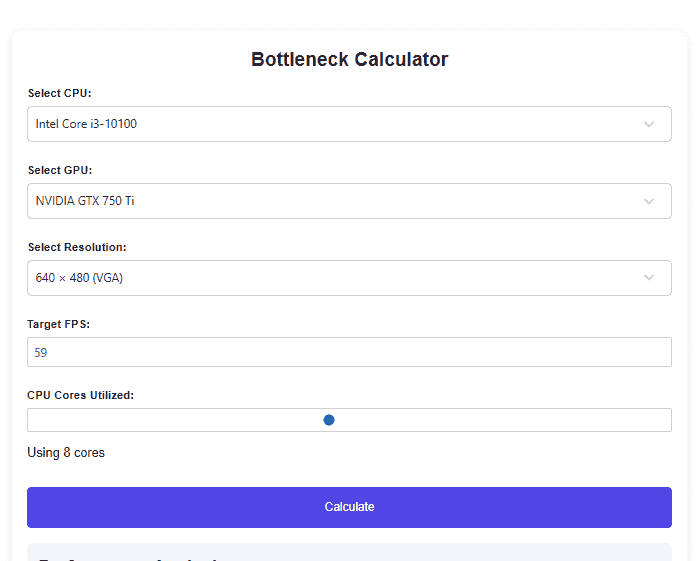
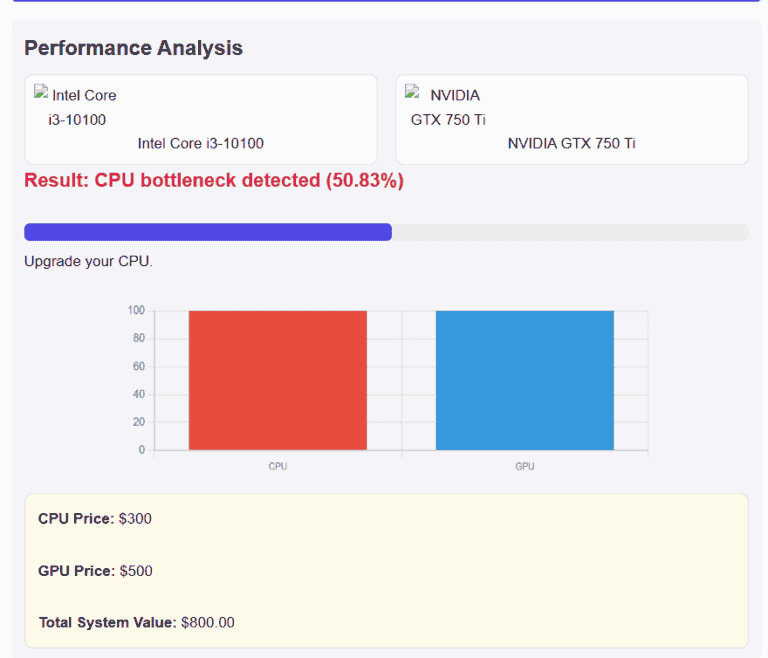
Bottleneck Performance in PC Systems
The Bottleneck is an issue that blocks the whole working of a PC in a place, it may be CPU issues or any other hardware issues, mainly it disturbs the performance of the system. In this case, we don’t identify the exact issue of the system, but we can use the ram bottleneck calculator to find this issue and solve it. In this way, the bottleneck helps the user to increase PC performance.
PC Requirement
These all requirements of the PC Best for You
Component | Percentage | Base Calculation |
|---|---|---|
CPU | 30% | Processing power |
GPU | 35% | Graphics performance |
RAM | 10% | Memory capacity |
STORAGE | 8% | SSD / NVMe |
Our Tool
These all Tools help for your help in find the sysyem issues
CPU vs GPU Bottleneck Calculator
| CPU | GPU | Estimated Bottleneck | Performance |
|---|---|---|---|
| Intel i5-12400 | NVIDIA RTX 3060 | Minor | 5-10% FPS loss |
| Intel i7-12700K | NVIDIA RTX 3090 | None | 0% FPS loss |
| AMD Ryzen 5 5600X | NVIDIA GTX 1660 | Major | 20-30% FPS loss |
| AMD Ryzen 7 5800X | NVIDIA RTX 3070 | Minor | 8-12% FPS loss |
| Intel i3-12100 | NVIDIA GTX 1650 | Major | 15-25% FPS loss |
| Intel i5-12600K | NVIDIA RTX 3070 | None | 0% FPS loss |
| AMD Ryzen 9 5900X | NVIDIA RTX 3080 | Minor | 5-10% FPS loss |
| Intel i7-12700 | NVIDIA RTX 3060 Ti | Minor | 5-10% FPS loss |
| AMD Ryzen 5 5600G | NVIDIA GTX 1660 | Major | 15-20% FPS loss |
| Intel i5-12400F | NVIDIA RTX 3060 | Minor | 5-10% FPS loss |
| Intel i9-12900K | NVIDIA RTX 3090 | None | 0% FPS loss |
| AMD Ryzen 7 5700G | NVIDIA RTX 3060 | Minor | 5-10% FPS loss |
| Intel i5-12500 | NVIDIA RTX 3060 Ti | Minor | 5-10% FPS loss |
| AMD Ryzen 9 5950X | NVIDIA RTX 3080 Ti | None | 0% FPS loss |
| Intel i3-10100 | NVIDIA GTX 1050 Ti | Major | 20-30% FPS loss |
| AMD Ryzen 5 3600 | NVIDIA RTX 2060 | Minor | 5-10% FPS loss |
| Intel i5-10600K | NVIDIA GTX 1660 Ti | Minor | 5-10% FPS loss |
| AMD Ryzen 7 3700X | NVIDIA RTX 2070 | Minor | 5-10% FPS loss |
| Intel i7-10700K | NVIDIA RTX 2080 | None | 0% FPS loss |
| AMD Ryzen 5 2600 | NVIDIA GTX 1060 | Major | 15-25% FPS loss |
| Intel i5-11400 | NVIDIA RTX 3060 | Minor | 5-10% FPS loss |
| AMD Ryzen 3 3100 | NVIDIA GTX 1650 | Major | 15-25% FPS loss |
| Intel i5-11600K | NVIDIA RTX 3070 | Minor | 5-10% FPS loss |
| AMD Ryzen 7 5800X3D | NVIDIA RTX 3080 | None | 0% FPS loss |
| Intel i9-11900K | NVIDIA RTX 3090 | Minor | 5-10% FPS loss |
| AMD Ryzen 5 5600X | NVIDIA RTX 3060 | Minor | 5-10% FPS loss |
| Intel i5-12600 | NVIDIA RTX 3060 | None | 0% FPS loss |
| AMD Ryzen 9 5900X | NVIDIA RTX 3070 | Minor | 5-10% FPS loss |
| Intel i7-12700K | NVIDIA RTX 3080 | Minor | 5-10% FPS loss |
| AMD Ryzen 7 5800X | NVIDIA RTX 3060 Ti | Minor | 5-10% FPS loss |
| Intel i5-12400 | NVIDIA RTX 2060 | Minor | 5-10% FPS loss |
| AMD Ryzen 3 3300X | NVIDIA GTX 1650 | Major | 15-25% FPS loss |
| Intel i3-12100F | NVIDIA GTX 1660 | Major | 15-25% FPS loss |
| AMD Ryzen 5 3600X | NVIDIA RTX 2060 | Minor | 5-10% FPS loss |
| Intel i5-10600 | NVIDIA GTX 1660 | Minor | 5-10% FPS loss |
| AMD Ryzen 7 3700X | NVIDIA RTX 3060 | Minor | 5-10% FPS loss |
| Intel i7-10700 | NVIDIA RTX 2070 | Minor | 5-10% FPS loss |
| AMD Ryzen 9 3950X | NVIDIA RTX 3080 | None | 0% FPS loss |
| Intel i9-10900K | NVIDIA RTX 3090 | None | 0% FPS loss |
| AMD Ryzen 5 5600G | NVIDIA RTX 3050 | Minor | 5-10% FPS loss |
| Intel i5-12400 | NVIDIA RTX 3050 | Minor | 5-10% FPS loss |
| AMD Ryzen 3 3100 | NVIDIA GTX 1050 Ti | Major | 20-30% FPS loss |
| Intel i3-10100 | NVIDIA GTX 1660 | Major | 20-30% FPS loss |
| AMD Ryzen 5 3600 | NVIDIA RTX 3060 | Minor | 5-10% FPS loss |
| Intel i5-11600K | NVIDIA RTX 3060 Ti | Minor | 5-10% FPS loss |
| AMD Ryzen 7 5800X3D | NVIDIA RTX 3070 | None | 0% FPS loss |
| Intel i9-11900 | NVIDIA RTX 3080 | Minor | 5-10% FPS loss |
| AMD Ryzen 9 5950X | NVIDIA RTX 3090 | None | 0% FPS loss |
| Intel i7-12700 | NVIDIA RTX 3060 | Minor | 5-10% FPS loss |
| AMD Ryzen 5 5600X | NVIDIA GTX 1660 Ti | Minor | 5-10% FPS loss |
| Intel i5-12400F | NVIDIA RTX 2060 | Minor | 5-10% FPS loss |
| AMD Ryzen 3 3300X | NVIDIA GTX 1650 Super | Major | 15-25% FPS loss |
| Intel i5-14600K | NVIDIA RTX 5070 | Minor | 5-10% FPS loss |
| Intel i7-14700K | NVIDIA RTX 5090 | None | 0% FPS loss |
| AMD Ryzen 7 8700X | NVIDIA RTX 5080 | Minor | 5-10% FPS loss |
| Intel i9-14900KS | NVIDIA RTX 5090 Ti | None | 0% FPS loss |
| AMD Ryzen 9 9900X3D | AMD Radeon RX 8900 XT | None | 0% FPS loss |
| Intel i5-14500 | NVIDIA RTX 5060 Ti | Minor | 6-10% FPS loss |
| AMD Ryzen 5 8600X | NVIDIA RTX 5050 | Minor | 8-12% FPS loss |
| Intel i3-14300 | NVIDIA RTX 5040 | Major | 20-25% FPS loss |
| AMD Ryzen 3 8400G | NVIDIA RTX 5050 Ti | Major | 18-25% FPS loss |
| Intel i7-14700F | NVIDIA RTX 5080 Ti | None | 0% FPS loss |
| AMD Ryzen 7 8700G | AMD Radeon RX 8800 XT | Minor | 5-10% FPS loss |
| Intel i9-14900K | AMD Radeon RX 8900 XTX | None | 0% FPS loss |
| AMD Ryzen 9 9950X | NVIDIA RTX 5090 Ti | None | 0% FPS loss |
| Intel i5-14400 | NVIDIA RTX 5050 Ti | Minor | 5-10% FPS loss |
| AMD Ryzen 5 8600G | NVIDIA RTX 5040 | Major | 15-20% FPS loss |
| Intel i7-14700K | AMD Radeon RX 8800 XT | Minor | 5-10% FPS loss |
| AMD Ryzen 7 8800X3D | NVIDIA RTX 5070 Ti | None | 0% FPS loss |
| Intel i9-14950X | NVIDIA RTX 5090 Super | None | 0% FPS loss |
| AMD Ryzen 9 9980X | AMD Radeon RX 8950 XT | None | 0% FPS loss |
| Intel i5-14500F | NVIDIA RTX 5050 Ti | Minor | 6-10% FPS loss |
| AMD Ryzen 7 8700X | NVIDIA RTX 5060 | Minor | 8-12% FPS loss |
| Intel i3-14100F | NVIDIA RTX 5040 | Major | 18-25% FPS loss |
| AMD Ryzen 3 8300 | AMD Radeon RX 8600 | Major | 20-30% FPS loss |
| Intel i7-14750K | NVIDIA RTX 5080 | None | 0% FPS loss |
| AMD Ryzen 9 9900X | NVIDIA RTX 5090 | None | 0% FPS loss |
| Intel i5-14600 | AMD Radeon RX 8750 | Minor | 5-10% FPS loss |
| AMD Ryzen 5 8600 | AMD Radeon RX 8700 XT | Minor | 8-12% FPS loss |
| Intel i9-14900HX | NVIDIA RTX 5090 Mobile | None | 0% FPS loss |
| AMD Ryzen 7 8800HS | NVIDIA RTX 5070 Mobile | Minor | 5-10% FPS loss |
| Intel i7-14700H | NVIDIA RTX 5060 Mobile | Minor | 8-12% FPS loss |
| AMD Ryzen 9 9900HX | AMD Radeon RX 8900M | None | 0% FPS loss |
| Intel i5-14500H | NVIDIA RTX 5050 Mobile | Major | 15-20% FPS loss |
| AMD Ryzen 5 8600HS | NVIDIA RTX 5040 Mobile | Major | 18-25% FPS loss |
| Intel i7-14700 | NVIDIA RTX 5070 | None | 0% FPS loss |
| AMD Ryzen 9 9950X3D | NVIDIA RTX 5080 Ti | None | 0% FPS loss |
| Intel i5-14400F | AMD Radeon RX 8700 | Minor | 10-15% FPS loss |
| AMD Ryzen 7 8750X | AMD Radeon RX 8800 XT | Minor | 5-10% FPS loss |
| Intel i3-14300F | AMD Radeon RX 8600 | Major | 20-25% FPS loss |
| AMD Ryzen 3 8400 | NVIDIA RTX 5040 Ti | Major | 20-25% FPS loss |
| Intel i9-14900K | NVIDIA RTX 5080 Ti | None | 0% FPS loss |
| AMD Ryzen 9 9980X3D | NVIDIA RTX 5090 Ti | None | 0% FPS loss |
| Intel i7-14700F | AMD Radeon RX 8750 XT | Minor | 5-10% FPS loss |
| AMD Ryzen 7 8800G | NVIDIA RTX 5050 | Minor | 10-15% FPS loss |
| Intel i5-14650K | NVIDIA RTX 5070 Ti | Minor | 5-8% FPS loss |
| AMD Ryzen 5 8650X | NVIDIA RTX 5060 Ti | Minor | 8-12% FPS loss |
| Intel i9-14900KS | AMD Radeon RX 8950 XTX | None | 0% FPS loss |
| AMD Ryzen 9 9970X | NVIDIA RTX 5080 Super | None | 0% FPS loss |
| Intel i7-14750 | NVIDIA RTX 5070 | Minor | 5-10% FPS loss |
Bottleneck Calculator use as a estimator for finding PC blockage?
Users can utilize a bottleneck calculator to balance compatibility with all PC components. These calculators use difficult algorithms to compare the related power and performance of different hardware elements. By putting all the details of your PC specs, such as CPU, GPU, RAM, and screen resolution, this tool shows the bottlenecking results in percentage. Then you need to upgrade this hardware.
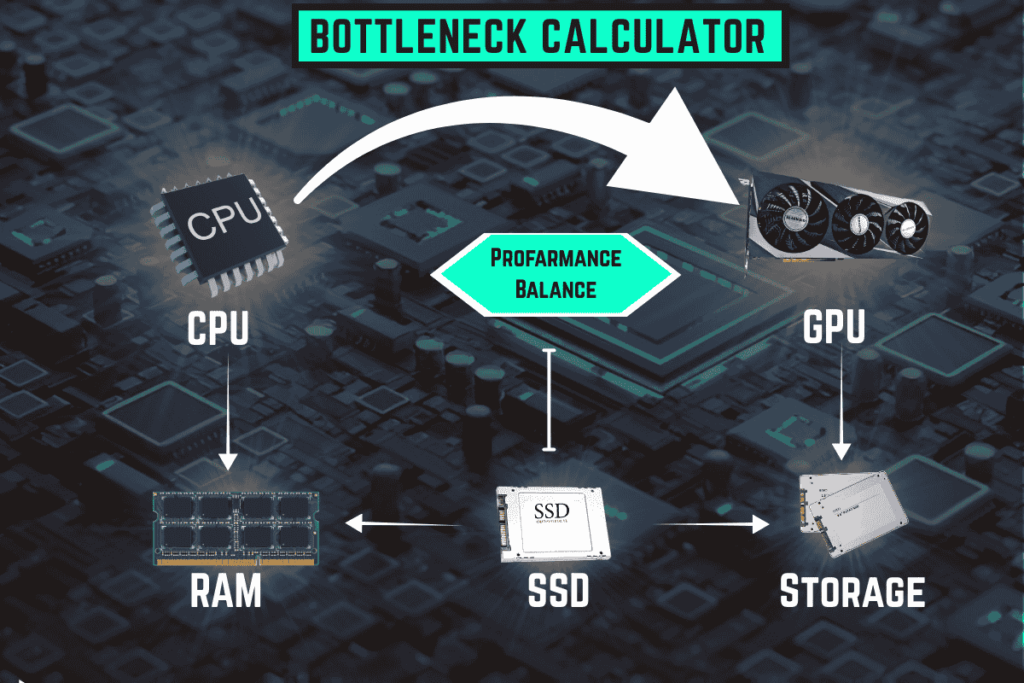
In the process bottleneck that gives high-value results, it’s important to note that insights are not perfectly accurate due to components like production differences and software optimization. It usually makes a percentage that signifies the possibility and severity of a bottleneck. For example, a result of 5% might suggest a minor bottleneck. At the same time, 60% or higher could display fundamental performance restrictions.
We use bottleneck calculators to:
Complete Guide to PC Bottleneck Calculator
The bottleneck calculator is used to identify and resolve issues with computer hardware. Officially, they help gamers in checking blockages and performance of the CPU, GPU, and other system hardware. Gamers decide on a good PC for their work by using this calculator. It calculates all components’ performance and provides the bottleneck percentage for the user.
How to Use the PC Bottleneck Calculator
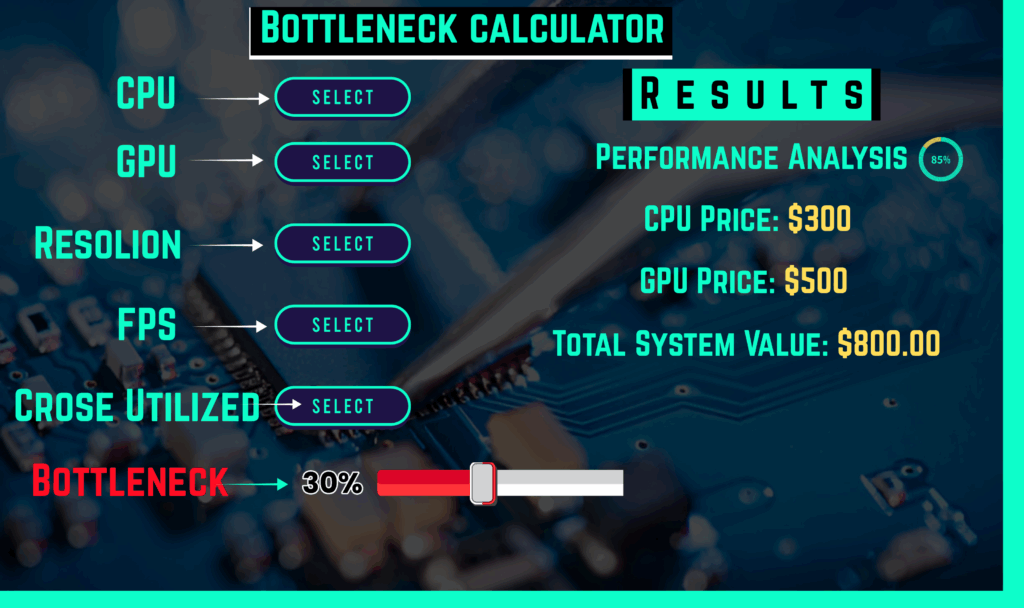
There are 4 steps for using this calculator:
- Go to http://bottleneckscalculators.com/.
- Enter your CPU, GPU, RAM, and Display resolution.
- Select your use case (Gaming, Editing, or Multitasking)
- Click Calculate and get your bottleneck analysis results.
System Optimization for detecrt bottleneck
Firstly, you check PC all specifications of your PC, then check the bottleneck by using this calculator. This Tool guides you on which hardware needs upgradation; then you can easily add upgrades to your system and balance the gpu and cpu compatibility of your PC. This is a simple and easy way to optimize your system.
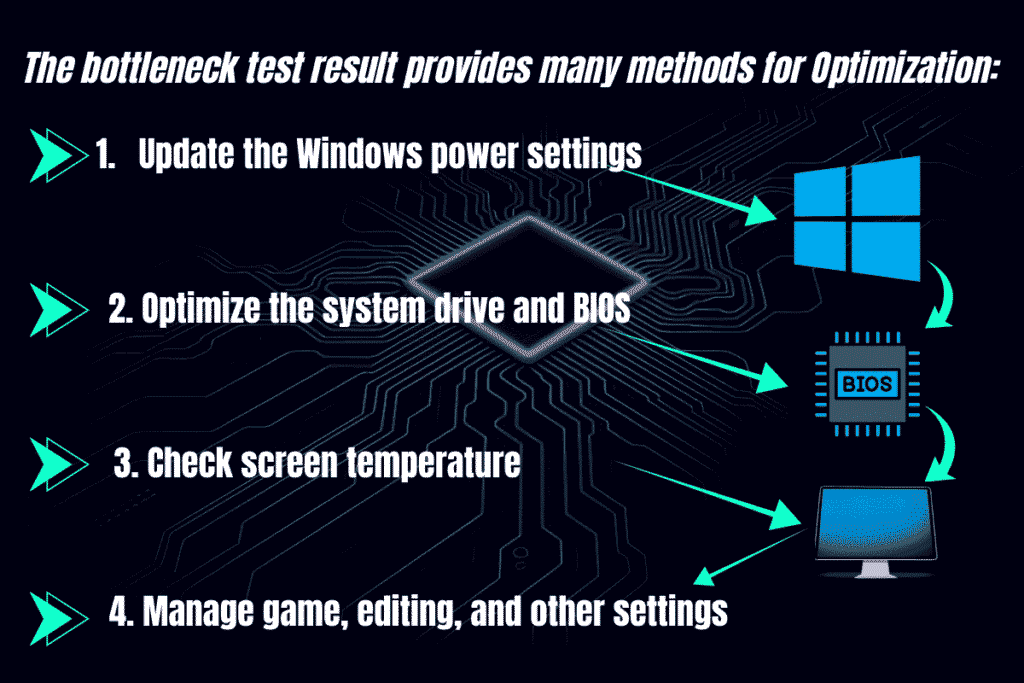
The bottleneck test result provides many methods for Optimization:
- Update the Windows power settings (use the Latest Version)
- Optimize the system drive and BIOS
- Check screen temperature
- Manage game, editing, and other settings based on the bottleneck calculator recommendation.
The Role of Our PC Bottleneck Calculator
In PC development, this calculator plays the role of an analyzer. This modern tool helps users to get capability information, system performance, and all issues of the key components of every PC system. It guides users about the processor (CPU), graphics card (GPU), and display resolution results before purchasing new hardware and upgrading an old system.
Your Trusted PC Bottleneck Calculator
The (bottleneckscalculators.com) is a trusted calculator because it is easy to use and has free-of-charge access for everyone. This tool is simple and provides near-accurate data for the PC system. Users can check the bottleneck for every type of PC. For example, gaming, editing, and all other businesses.
Understanding GPU and CPU Bottlenecks
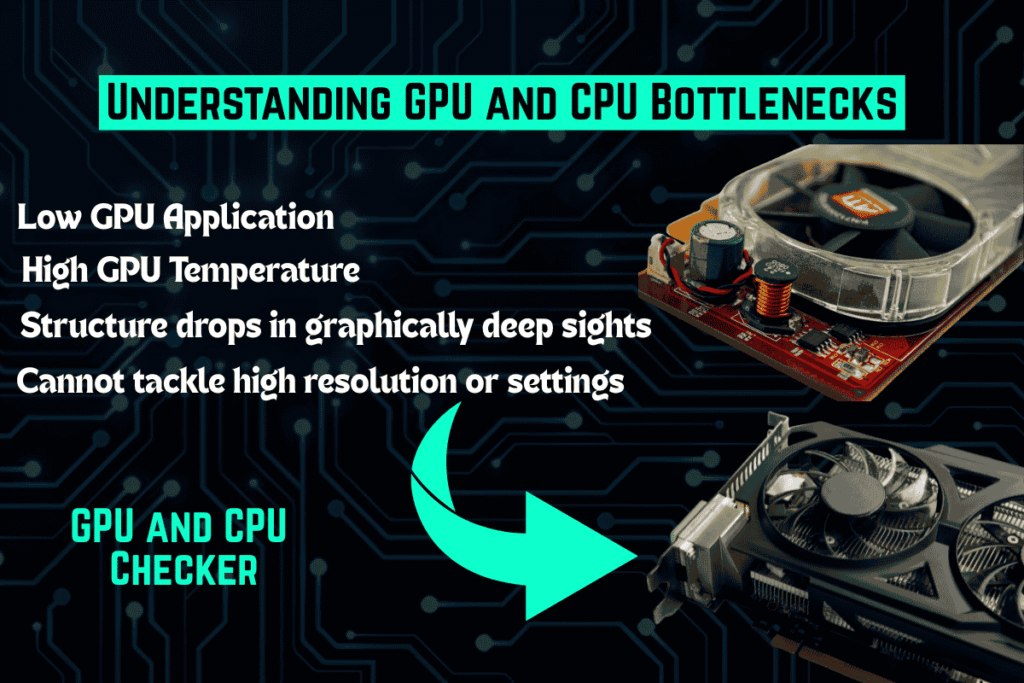
GPU and CPU bottlenecks come when one part hinders the performance of the other, heartbreaking universal system productivity. Now we are exploring more details about the bottleneck impact on computer performance:
GPU Bottlenecks come during the time the graphics card ends the system’s performance.
The keys to GPU bottlenecks include:
- Low GPU Application
- High GPU Temperature
- Structure drops in graphically deep sights.
- Cannot tackle high resolution or settings
Point out GPU bottlenecks:
- Upgrade to a graphics card.
- Lower in-game graphics settings
- Reduce upscaling technologies (High screen Resolution)
- Enhance GPU cooling
- Update GPU drivers
A CPU Bottleneck occurs when the processor can not keep up with the video card’s output. This is the result:
- Lower stage rates in games
- Sputtering or micro-stutters during gameplay
- Underapplication of the GPU
- High CPU usage, often at 100%.
Common reasons for a CPU bottleneck:
- Outmoded or low-performance processors
- Limited CPU cores or hardware for new applications
- Poor CPU cache size.
Point out CPU bottlenecks:
Upgrade to a more capable processor.
- Overclock the CPU.
- Off-background applications to free up CPU resources.
- Lower in-game settings that are CPU-intensive.
How to Interpret Bottleneck Calculator Results

Optimizing the performance of a PC is a very important factor in system selection and upgrading, especially after understanding the importance of CPU GPU combo calculator compared to examining main components, such as hardware compatibility and future evidence.
- Understanding the Percentage
- Evaluating Component Performance
- Considering Future Software Needs
Real-Life Examples of Reducing PC Bottlenecks
After optimizing and understanding system hardware, we are exploring real-time examples of reducing PC bottlenecks. These symbols directly impact on performance and credibility of the computer system. Simply, these are all balanced to all PC hardware like CPU, GPU, RAM, and screen resolution.
- Upgrading the CPU for High-End GPUs
- Increasing RAM Speed and Capacity
- Improving Cooling to Enhance Performance.
Real-world Performance Considerations
Meanwhile, this calculator provides valuable results that are very helpful for the user. In reality, PC system performance is supported by many factors. The bottleneck test insights should be examined closely to:
- – Single usage possibilities and approaches
- – System freezing and melting performance
- – Driver issues and system updates
- – Background processes and system improvement
Everything you need to get up and running
Every PC runs smoothly when all its basic requirements are complete and match all hardware. One of the main things in PC work is its performance. That’s a way to understand your PC percentage results and upgrade your PC if needed: upgrade CPU, GPU, RAM, storage, and Screen resolution.
Maximize Your PC’s Performance
Your PC’s performance depends on all key components of your system. The PC needs all hardware to work smoothly and to create a balanced environment. Every hardware component depends on the other; that way, every part needs to work properly for good performance of the system. You can upgrade your PC’s key components and use the latest Windows to maximize your PC’s Performance.
Ram Bottleneck Performance in PC Systems
The Bottleneck is an issue that blocks the whole working of a PC in a place, it may be CPU issues or any other hardware issues, mainly it disturbs the performance of the system. In this case, we don’t identify the exact issue of the system, but we can use the bottleneck calculator to find this issue and solve it. In this way, the bottleneck helps the user to increase PC performance.
Advanced Performance Analysis Methods
Our bottleneck tool developers’ team uses many methods and provides the correct results. This tool uses both methods; the first one is technical, and the second is theoretical. Show the result to the user. This is a modern evolution for PC selection.
The bottleneck calculator examines many options:
- – Gaming production at different resolutions
- – Content building workloads
- – Multitasking efficiency
- – System sensitivity under load
Gaming Performance Analysis with PC Bottleneck Calculator
Our bottleneck professionals analyze multiple gaming PC performances using different methods. They use heavy games with different hardware then they reach a comprehensive result. Now they are providing accurate results for the user.
- Check CPU and GPU during gameplay
- Use new or modern RAM
- Check stability and consistency rate
- Check the screen resolution’s impact on speed
Optimizing PC Systems for Optimal Performance
Make sure your computer performance is optimal, but it requires many parts to work in a balanced way to support the PC. These are some main steps that help you optimize the system for optimal performance:
- Hardware Selection and Upgrade
- System Improvement
- Performance tuning up
Understanding Bottlenecks in PC Systems
Basically, bottlenecks are blockages of the system, which is the main issue of hardware. If a PC is facing a bottleneck, it does not work properly and implement all required actions; it may be a CPU, GPU, RAM, or any other hardware issue. We can use the bottleneck calculator as an issue-finder tool.
Understanding hogwarts legacy laggy PC Bottleneck Calculator Accuracy
Our expert team uses this tool with multiple monitors and tests this result accuracy and every time it shows near-accurate stats. Mostly, users have an idea about their system, and this Valorant tool helps users unlock bottleneck issues.
The Main Analysis Areas of the PC Bottleneck Calculator
PC bottleneck mainly covers these Areas:
Processors (CPU): It is the brain of the computer, and all work depends on it. When all key components demand high speed, the processor shows insufficient speed and does not fulfill this demand. Mostly, these issues are shown during gaming and video editing.
Video Graphic Card (GPU): Image and Video is a major interpretation. GPU bottleneck occurs when the graphics card’s data processing speed is not equal to the speed at which on CPU provides data.
Memory (RAM): RAM is important for quickly running and managing programs and managing data in processes. If the memory size is limited or its speed is very slow. It may not properly support to CPU’s needs. That’s why data processing speed is slower. Especially in multitasking and heavy memory applications.
Screen Resolution: Higher resolution always demands higher processing power from the GPU to complete any task. The bottleneck calculator will evaluate whether the system can handle all situations without any issues.
Key Components in PC Bottleneck Calculator Analysis
The gaming bottleneck nzxt fps fortnite calculator is an analyzer of all PC components. It is right that this does not show completely correct data due to manufacturing issues. But its result is always close to accurate.
Central Processing Unit (CPU):
The CPU is the main part and brain of the computer. It is responsible for all actions of the computer. The bottleneck calculator analyzes the basic counting, frequency of time, and architecture of the compute to decide whether it can work with hardware or it can create a performance bottleneck.
Graphic Processing Unit (GPU):
The GPU controls all graphics, images, and video results. The Bottleneck calculator handles all GPU abilities, counting, speed, and memory to decide if it can match heavy resolution and heavy frame-rate rendition.
Motherboard: ( Best motherboard for ryzen 9 7900x3d )
The motherboard manages all components and the processing of the CPU. It connects all hardware and is able to run software for work. Its working speed directly affects to whole system. The bottleneck calculator checks the motherboard working speeds for the PC bottleneck.
Random Access Memory (RAM):
The RAM is mainly used to manage system speed during multitasking. This tool is used as a tester of the capacity of RAM task management ability.
Storage Devices (HDD):
The write and read speed of storage devices are directly facts to system speed. The bottleneck calculator creates a check and balance between all hard drives and shows their blockage in percentage.
Screen Resolution:
The monitor shows all outputs of the system, and its working depends on all other hardware. Sometimes the monitor does not show the result properly, and it faces some issues. This tool tests monitor capacity and shows bottleneck issues.
Power Supply Units (PSU):
Power supply is the main component in all implementations. Mostly, this power supply faces bottleneck issues. This is the best finder and detector tool for the blockage of the power supply and shows the result.
Advanced Bottleneck Analysis Features
In 2025, use advanced technology systems to find the correct bottleneck issues of any PC system to help for user. This tool checks multiple factors to show the result, including:
- – Parts performance metrics and qualifications
- – System assets exercise patterns
- – Inter-part communication performance
- – Performance moving up across dissimilar resolutions
The bottleneck calculator shows results for all PC components and guides which parts need to be upgraded for optimization.
The Limitations of the PC Bottleneck Calculator (gtx 1060 power draw)
The explanation for this tool’s limitation is that it is not fully correct, and it shows an estimate, but it is close to accurate. Most user already know a little bit of information about their PC and get help from this tool.
Common Bottleneck Scenarios and Solutions
Finding and solving bottlenecks is an important process in a PC system. Here are some PC bottleneck scenarios and Solutions:
Memory and Storage Bottleneck:
Identification Method:
A system may experience laziness when any storage device slows, high loading speed, and applications, then the system shows insufficient RAM.
Solution:
RAM Upgrade: Increase your system RAM for special tasks, which can help in a memory bottleneck. Storage Upgrade: Change the slow HDD to a faster SSD, which can improve system loading speed.
CPU Bottleneck:
Identification Method: A CPU bottleneck occurs when CPU usages reach 100% and GPU usage remains low ( 40%), then the CPU faces a bottleneck.
Solution: Upgrade your CPU to maintain the performance of all components. Use a PC that fulfills the demands of the GPU. Intel 5 or Ryzen 5 is recommended for gaming. Mostly heavy-loaded games need a heavy PC.
GPU Bottleneck:
Identification Method: When the GPU speed is not permanently matched with the CPU, the GPU faces a bottleneck.
Solution: A graphics card is mostly used in a gaming PC due to high graphics. We need to increase the settings and capabilities of the GPU according to the CPU.
Preventative Measures and Maintenance:
Regular PC Cleaning:
A PC is an electronic machine, and every electronic machine needs maintenance for caring. We should clean this after a week, then it will work properly and process data.
Keep Drivers and Software Up-to-date:
With time, everything needs to be upgradation due to market changes and requirements. When any device is old, it does not work properly. We need to upgrade the software and all the hardware.
Upgrade Your PC Based on PC Bottleneck Calculator Recommendations
Every PC needs to be upgraded to run high-quality software and games. This calculates PC needs and recommends to users all changes for proper working during any task. This tool provides a problem for the user. Here are some basic upgrades:
- Identifying Upgrade Needs
- Making Upgrade Decisions with Tools and Analysis
- Upgrading Components Based on Recommendations
- Compatibility and Professional Installation
Workstation Performance Evaluation
The 4080 super bottleneck calculator works properly in finding the PC system blockage. This is an evaluation in its field, especially for PC users. They get help in finding the PC bottleneck, figure out this issue, and then find solutions to all issues in the form of replacing the PC or upgrading.
System Monitoring and Performance Tracking
If we check your system daily and track this performance, then we can maintain this working speed and check the processing method. We need to maintain the temperature and the wire blockage of our PC. All these things are important for the good working of the PC.
The problem with bottleneck calculators
One of the biggest problems with this calculator is that most users do not know how the use this tool. This is the main problem of the user, meaning a lack of information. In the above paragraph, we guide the step-by-step use of this tool.
Bottleneck calculators, workload, and hardware
Apex Legends stuttering bottleneck calculator always checks the hardware workload, which becomes the reason for the blockage of the system. When any PC faces a heavy workload and heavy processing data its speed slows and faces bottleneck issues. The main work of this tool find out all these issues.
Why bottleneckscalculators.com Is a Trustworthy PC Bottleneck Calculator
We built this tool 5 years ago to help users and our expert team check and update all its work methods. Now we are putting advanced features in this using AI. That’s why this tool is to much trustworthy.
Conclusion:
The Bottleneck calculator is a perfect tool for finding bottleneck issues in any PC system. In this tool, we put all specifications such as CPU, GPU, RAM, and screen resolution, and then it shows the results in percentage. This insight is very helpful for the user. Every computer user can check their PC performance estimator and the compatibility of all PC hardware by using this tool.
Some GPU and CPU for systems that we recommeneded for you?
1. amd radeon rx 6600m
2. amd ryzen 7 5800x 8 core processor 3.80 ghz
3. 5900x vs 3700x
4. 5800x3d vs 7600x
5. 4070s vs 1080
6. 5800x3d vs 9600x
7. 1950x threadripper
8. 5700x3d msrp
9. amd 1950x
10. i7 3770 spec
11. 7600x3d overclock
12. i5 6500
13. amd ryzen 7 5700g benchmark
